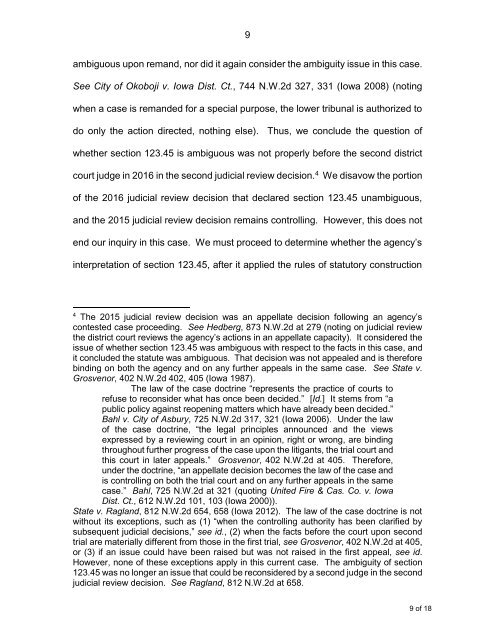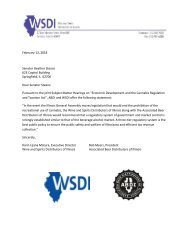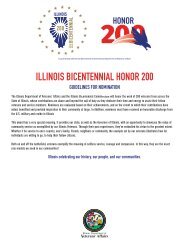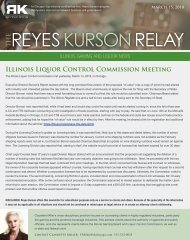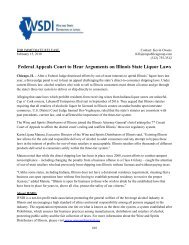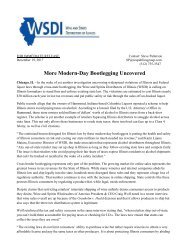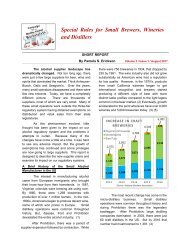Create successful ePaper yourself
Turn your PDF publications into a flip-book with our unique Google optimized e-Paper software.
9<br />
ambiguous upon remand, nor did it again consider the ambiguity issue in this case.<br />
See City of Okoboji v. Iowa Dist. Ct., 744 N.W.2d 327, 331 (Iowa 2008) (noting<br />
when a case is remanded for a special purpose, the lower tribunal is authorized to<br />
do only the action directed, nothing else). Thus, we conclude the question of<br />
whether section 123.45 is ambiguous was not properly before the second district<br />
court judge in 2016 in the second judicial review decision. 4 We disavow the portion<br />
of the 2016 judicial review decision that declared section 123.45 unambiguous,<br />
and the 2015 judicial review decision remains controlling. However, this does not<br />
end our inquiry in this case. We must proceed to determine whether the agency’s<br />
interpretation of section 123.45, after it applied the rules of statutory construction<br />
4<br />
The 2015 judicial review decision was an appellate decision following an agency’s<br />
contested case proceeding. See Hedberg, 873 N.W.2d at 279 (noting on judicial review<br />
the district court reviews the agency’s actions in an appellate capacity). It considered the<br />
issue of whether section 123.45 was ambiguous with respect to the facts in this case, and<br />
it concluded the statute was ambiguous. That decision was not appealed and is therefore<br />
binding on both the agency and on any further appeals in the same case. See State v.<br />
Grosvenor, 402 N.W.2d 402, 405 (Iowa 1987).<br />
The law of the case doctrine “represents the practice of courts to<br />
refuse to reconsider what has once been decided.” [Id.] It stems from “a<br />
public policy against reopening matters which have already been decided.”<br />
Bahl v. City of Asbury, 725 N.W.2d 317, 321 (Iowa 2006). Under the law<br />
of the case doctrine, “the legal principles announced and the views<br />
expressed by a reviewing court in an opinion, right or wrong, are binding<br />
throughout further progress of the case upon the litigants, the trial court and<br />
this court in later appeals.” Grosvenor, 402 N.W.2d at 405. Therefore,<br />
under the doctrine, “an appellate decision becomes the law of the case and<br />
is controlling on both the trial court and on any further appeals in the same<br />
case.” Bahl, 725 N.W.2d at 321 (quoting United Fire & Cas. Co. v. Iowa<br />
Dist. Ct., 612 N.W.2d 101, 103 (Iowa 2000)).<br />
State v. Ragland, 812 N.W.2d 654, 658 (Iowa 2012). The law of the case doctrine is not<br />
without its exceptions, such as (1) “when the controlling authority has been clarified by<br />
subsequent judicial decisions,” see id., (2) when the facts before the court upon second<br />
trial are materially different from those in the first trial, see Grosvenor, 402 N.W.2d at 405,<br />
or (3) if an issue could have been raised but was not raised in the first appeal, see id.<br />
However, none of these exceptions apply in this current case. The ambiguity of section<br />
123.45 was no longer an issue that could be reconsidered by a second judge in the second<br />
judicial review decision. See Ragland, 812 N.W.2d at 658.<br />
9 of 18


